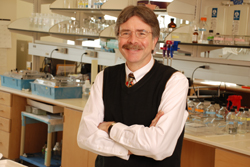 |
Joe Sisson, M.D. |
NOTE: This profile is part of a series highlighting the 26 researchers who were named UNMC Distinguished Scientists or New Investigators for 2007. Each of these researchers will be profiled in UNMC Today leading up to a Thursday ceremony to recognize their achievements.
- Name: Joe Sisson, M.D.
- Title: Larson Professor and chief of the UNMC Pulmonary, Critical Care, Sleep and Allergy Section
- Joined UNMC: 1987
- Hometown: Waterloo, Iowa
Describe your research in 25 words or less (in laymen terms, please).
Our laboratory studies how alcohol, smoke and organic dusts disturb the function of lung cilia, which are the motile finger-like projections of cells that clear inhaled particles from the lung.
What led you to pursue this area of research?
Our pulmonary research group has studied airway diseases for more than two decades. When I arrived at UNMC in 1987, however, no one was studying cilia, which play a critical function of clearing the airways of mucus, inhaled particles and debris. Dr. Stephen Rennard, who recruited me to UNMC, suggested that the study cilia would be interesting, productive and compliment other research ongoing in our section. He was right on all three counts.
How do you see your research contributing to science?
We have determined specific mechanisms through which alcohol and cigarette smoke alter ciliary function in the lung airways. This is changing the way we think about why alcohol abuse leads to lung infections and may contribute to the development of chronic airway diseases such as chronic obstructive pulmonary disease (COPD).
Why did you become a scientist?
To quote an attending physician at Utah during my residency, Dr. Burt Janis, “If you have the option of guessing or knowing, always know.” I have, as a physician, always believed that hypothesis-based thinking makes for better patient care since it forces you to grapple both what is known and what might be knowable. Knowing how things work drives the scientist in me.
What is your hope for the next generation of scientists?
That they take the next leap with the genome and modern clinical research and start to untangle many of the “idiopathic” causes of diseases.
Beyond grant funding, how do you measure success?
The greatest measure of a scientist is to whether they amplified their findings through training the next generations of scientists and by publishing their work.
What would you tell a student interested in a research career?
Find a good mentor, share their excitement about the work and then dedicate the time it takes to become a well-trained investigator.
Do you have a hero/role model? If so, what do you admire most about them?
My role model is Dr. Guy Zimmerman, a physician and distinguished professor at the University of Utah Medical Center. Guy instilled in me the excitement found in creating new knowledge and the importance of linking the science to the practice of medicine.
Tell us about your family and hobbies outside of the lab.
My wife is Dr. Jennifer Larsen, who is a physician-scientist at UNMC, chief of the diabetes, endocrinology, and metabolism section and associate dean for clinical research for the College of Medicine. We have two terrific children: our son Jeff will graduate from film school this year in New York and wants to pursue a career in film-as-art; our daughter is a senior at Westside High School, who runs cross-country and spring track and wants to pursue a foreign language major in college next year. I am an avid runner (slow but persistent), like to read fiction and history and have a passion for developing databases. As a family we love to travel, learn about new cultures and talk about world politics.
List three things few people know about you.
- Although we have been at UNMC for more than 20 years, a surprising number of people on campus do not know that Jennifer and I are married.
- I built an inpatient billing database for our section that has been in production since 1993.
- In another life, I would come back as a jazz pianist.